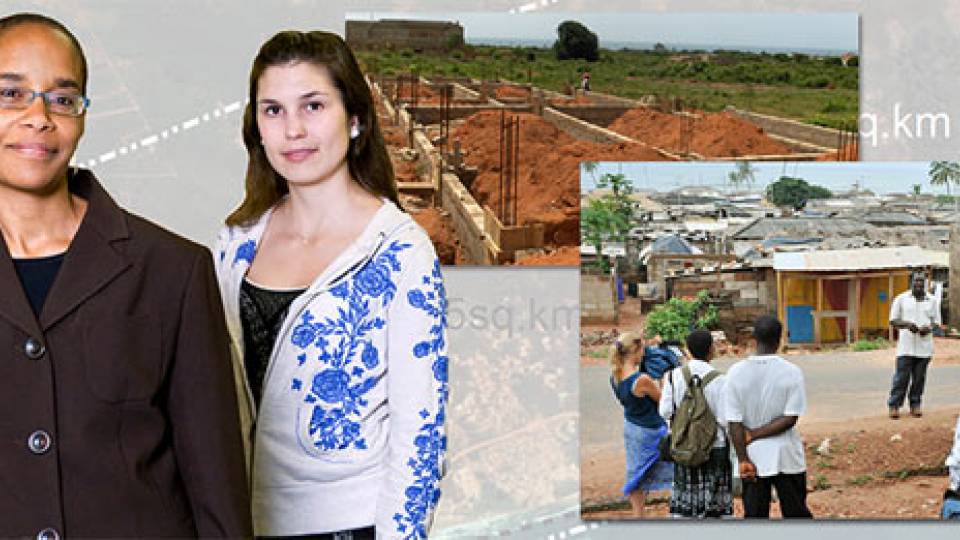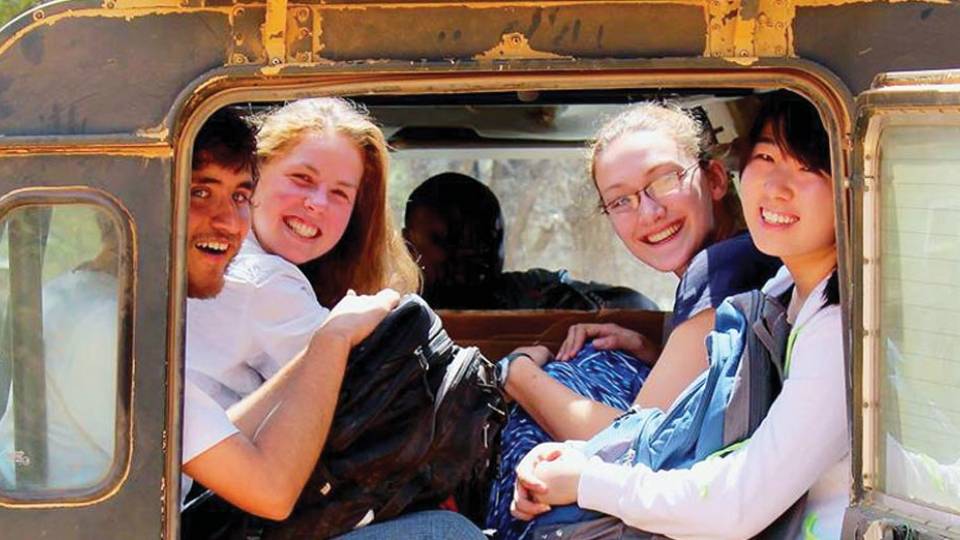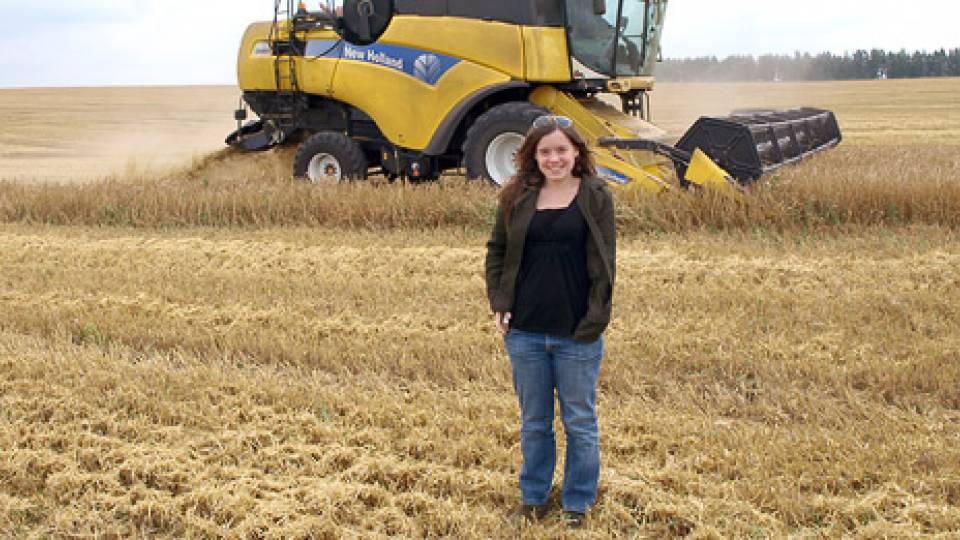Grand Challenges collaborations focus on development, energy, health solutions
Coming from Uganda, junior Yolisa Nalule has seen the devastating impact of AIDS and other diseases on her country. Last summer, through Princeton's ambitious Grand Challenges Program, she was able to return to her hometown of Kampala to conduct research focused on improving local health conditions while furthering her own studies in health policy.
As part of a global project on AIDS treatment begun by anthropology professor João Biehl, Nalule visited hospitals, church-organized programs and government-owned treatment centers, talking to health professionals about how and why they changed AIDS patients' treatments.
"I have seen firsthand the effects a number of infectious diseases, especially AIDS, have had on a large population with a poor public health infrastructure and limited resources," said Nalule, a molecular biology major pursuing a certificate in global health and health policy.
"It was indeed an incredible journey into the world of public health, especially doing it in my hometown," said Nalule, whose parents and five siblings live in Kampala. "Putting together all the frustrations and eureka moments, I did truly enjoy how much I was learning through doing fieldwork."
Nalule and Biehl are among several dozen Princeton students and faculty taking aim at the world's most pressing — and complex — problems through the Grand Challenges Program. This interdisciplinary, collaborative effort by the Princeton Environmental Institute (PEI), the School of Engineering and Applied Science and the Woodrow Wilson School of Public and International Affairs is creating new programs in teaching and research in the areas of development, energy and health while building on the University's existing strengths in these areas.
The program began in 2007 with a five-year grant from the High Meadows Foundation and is fostering new opportunities in the classroom, in research labs and in the field, with experiential learning for students as a primary component of the initiative.
A central tenet of Grand Challenges is that problems in all three categories require expertise from scientists, engineers and public policy scholars, as well as those in the humanities and social sciences, for solutions to be developed and implemented effectively. By including students in this work, the University is training them to be leaders in developing the answers to these global challenges.
"These are among the most intransigent problems facing this generation of students," said Katharine Hackett, executive director of Grand Challenges and associate director of PEI. "Grand Challenges provides a forum for engaging students and faculty to seek solutions in a dynamic interdisciplinary fashion."
Leading the individual research programs are ecology and evolutionary biology professor Daniel Rubenstein (development), mechanical and aerospace engineering professor Robert Socolow (energy) and economics and public affairs professor Christina Paxson (health).
As a result of a campuswide call for research proposals, each Grand Challenge area is supporting work by faculty in at least seven disciplinary areas, connecting faculty and students across the University. The faculty projects are supported by seed grants and by several New Investigator Grants, which provide awards of up to $100,000 per year to faculty members who are redirecting the focus of their research to address an area under Grand Challenges.
The professors' research provides material to augment existing courses and sparks new courses that bring awareness of the interdisciplinary Grand Challenges themes to students across academic disciplines. Students also are provided information on courses and funding for independent research related to the topic areas through the Grand Challenges website.
A number of events have been organized to highlight the Grand Challenges program, including a two-day colloquium called "The Grand Challenges: Energy, Water and Global Health" in April that addressed topics such as global health and infectious disease; rural poverty, land use, biodiversity and water in Africa; energy, environment and security; and environmental justice.
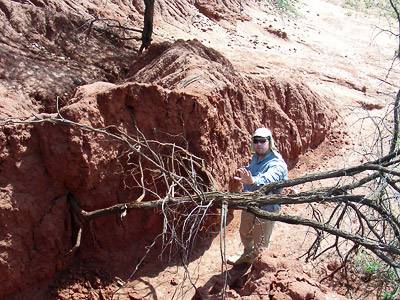
Trenton Franz, a fourth-year graduate student in civil and environmental engineering, has traveled to Princeton's research base in Kenya to study the hydrology of Africa's dryland ecosystems. Franz examines a washed-out tree's root system to gain insight into its water source. (Photo: Alex Lester)
Development Grand Challenge
Capitalizing on Princeton's existing research efforts in Africa, the Development Grand Challenge is focusing on balancing economic development in African countries with preserving biodiversity and natural resources.
"What makes Grand Challenges initiatives so special are their connection to both the learning and research functions of the University," said Rubenstein, the Class of 1877 Professor of Zoology, chair of the Department of Ecology and Evolutionary Biology and director of the Program in African Studies. Faculty and students in the program "make a difference in people's lives and those of other species that share the same landscape."
The largest research effort within the Development Grand Challenge is the Water, Savannas and Society Project at the Mpala Research Centre in central Kenya, which began in 2006 and became affiliated with Grand Challenges in 2007.
Rubenstein, Princeton colleagues and Kenyan scientists are studying how water moves over and through land, how different plants affect water retention, how water movements affect wildlife and livestock, and how a scarcity of resources affects people's land use patterns. Rubenstein's Princeton colleagues at Mpala include professors in civil and environmental engineering, electrical engineering, politics and international affairs.
Trenton Franz, a fourth-year graduate student in civil and environmental engineering, studies hydrology through the Ewaso Water Project, the field research component of the Water, Savannas and Society Project. Through Grand Challenges, he has received funding for several semesters of study, fieldwork and travel to conferences to present his research on the dryland ecosystems that make up much of Africa's pastoral land. He has also received invaluable help from the biologists and other engineers involved in the Ewaso project.
"The diversity of expertise has been very crucial in providing information on a difficult interdisciplinary problem that the Water, Savannas and Society/Ewaso Water Project is trying to address," Franz said.
New projects initiated by Grand Challenges include a joint development and energy initiative in southern Africa to study how the response to climate change and accompanying changes in land use may affect vulnerable ecosystems. This effort is led jointly by Princeton's David Wilcove, professor of ecology and evolutionary biology and public affairs and director of the Program in Environmental Studies, and Michael Oppenheimer, the Albert G. Milbank Professor of Geosciences and International Affairs, along with research affiliates from the nonprofit organization Conservation International.
Another project to build a sustainable school in Ghana is led by Carolyn Rouse, associate professor of anthropology and African American studies. Junior Ashley Schoettle, a Wilson School major pursuing a certificate in global health and health policy, spent the summer in Ghana, working on a malaria study related to Rouse's school project. Rouse's guidance helped Schoettle as she interviewed local residents and found that aid organizations were unaware of local attitudes and customs.
"I had many engaging and interesting conversations with her discussing Africa, development and Africans' perceptions of themselves," Schoettle said. "It was fascinating to learn from an anthropologist, as my studies so far have been mostly policy-focused."
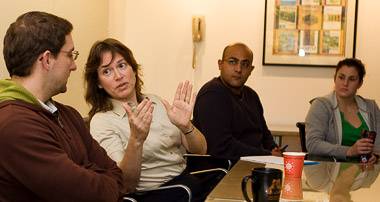
Grand Challenges is funding professors who are redirecting their research focus to projects within the initiative's scope. For instance, Emily Carter (second from left), the Arthur W. Marks '19 Professor of Mechanical and Aerospace Engineering and Applied and Computational Mathematics, whose work has focused on theoretical chemistry, is now working with graduate students in chemical engineering, chemistry and physics to design new materials for harvesting solar energy. (Photo: Brian Wilson)
Siebel Energy Grand Challenge
In its first year, the Siebel Energy Grand Challenge began addressing a number of energy issues with the help of a five-year grant from the Thomas and Stacey Siebel Foundation.
"The program is building a community of scholars across the Princeton campus to tackle three main facets of the energy challenge — namely in energy technology, energy security and policy as well as climate change research," said Pascale Poussart, assistant director of energy initiatives at PEI who helps manage the Energy Grand Challenge.
The program's three principal projects are the Oil, Energy and the Middle East initiative, a program that was launched by the Department of Near Eastern Studies, PEI and the Princeton Institute for International and Regional Studies two years ago; a new solar energy project directed by Emily Carter, the Arthur W. Marks '19 Professor of Mechanical and Aerospace Engineering and Applied and Computational Mathematics; and a research study that examines the biological effects of carbon dioxide on the world's oceans by François Morel, the Albert G. Blanke Jr. Professor of Geosciences.
Carter, one of two faculty members to receive a 2007-08 Grand Challenges New Investigator Grant, is working with graduate students in chemistry, chemical engineering and physics to design highly efficient solar cell materials. She also is co-teaching a new course on solar energy conversion this fall with Sigurd Wagner, a professor of electrical engineering and a solar energy expert. Carter, whose work has largely focused on theoretical chemistry, welcomed the opportunity to expand her research into alternative energy.
"Princeton is acting decisively and boldly to stake out a leadership position toward solving these crucial problems of energy and environment, which are the great technological challenges of our lifetime," she said. "We've coasted so long on fossil fuels and ignored the data that indicates what human beings are doing to alter Earth's climate."
Additionally, the Energy Grand Challenge organized a six-part lecture series last spring around the work of the Nobel Prize-winning Intergovernmental Panel on Climate Change. This fall, the Energy Grand Challenge is sponsoring a five-part lecture series on ethics and climate change. Among other projects, the program also has initiated a Princeton Energy and Climate Scholars program as an interdisciplinary forum for graduate students to discuss their work on energy and climate issues, supported a graduate student trip to Saudi Arabia related to a course on U.S. energy policy toward the Arab nation, and funded undergraduate summer internships.
In 2008, summer internships included studying air quality monitoring in Beijing, fusion in Finland and carbon sequestration in Italy; initiating renewable energy projects in Native American land in the Southwest United States; and designing energy alternatives through the cultivation and bioconversion of macroalgae.
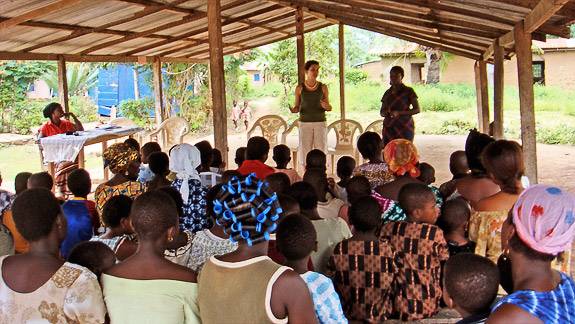
Ashley Schoettle's research on malaria prevention policy took her to Ghana, where she conducted research and interviewed people about the effectiveness of different methods, such as distribution of insecticide-treated bed nets. In a small village in the Hohoe district, shown here, Schoettle and a translator explained the importance of using malaria prevention techniques for pregnant women and children. (Photo: Courtesy of Ashley Schoettle)
Health Grand Challenge
The Health Grand Challenge concentrates its efforts on infectious diseases across the globe.
"Fitting the Grand Challenges model of cross-disciplinary solutions to complex problems, the health research projects bridge the natural and social sciences, addressing prevention and treatment of infectious diseases that afflict developing and developed countries alike," said Paxson, the Hughes-Rogers Professor of Economics and Public Affairs, chair of the Department of Economics and director of the Center for Health and Wellbeing in the Wilson School.
In its first year, the Health Grand Challenge awarded seven seed grants to faculty researchers, in addition to conferring a New Investigator Grant upon anthropologist Biehl for research on global AIDS treatment. It also introduced diverse opportunities for undergraduate independent work and internships.
Many of the students' summer projects were tied to faculty research, such as research on microbial pathogenesis within the Department of Molecular Biology, and work in South Africa, Brazil and Uganda related to AIDS awareness and treatment.
While she was in Uganda this summer, Nalule and the other students involved in the global AIDS treatment project contributed to an online forum on the Blackboard academic website, reporting their findings and receiving guidance from Biehl.
"Outside of class and in the field, he was a tremendous resource in helping me learn to look for unanswered questions," Nalule said. "Without Professor Biehl's help and advice, my fieldwork would not have been as insightful as it was."
In the coming year, the Health Grand Challenge is hoping to showcase both its research and related issues through events such as lectures, panel discussions and a symposium on malaria.
In addition, Paxson and other researchers are working to establish "research bases" in countries such as Ghana, Brazil and South Africa.
Said Paxson, "Although there are many opportunities for Princeton students to conduct research and/or complete summer internships, the Grand Challenges model produces a very integrated and focused experience for students."



